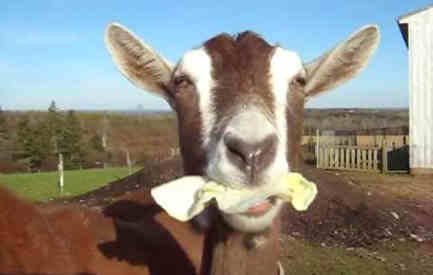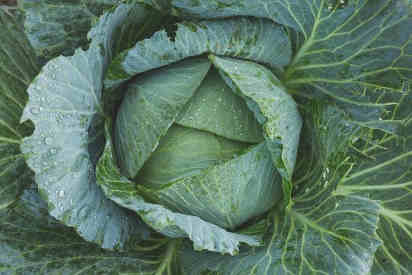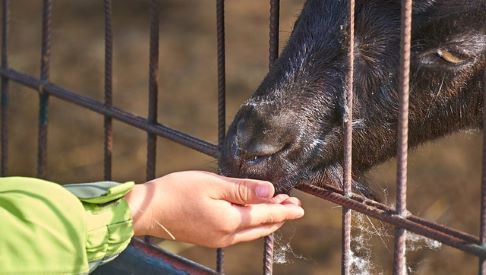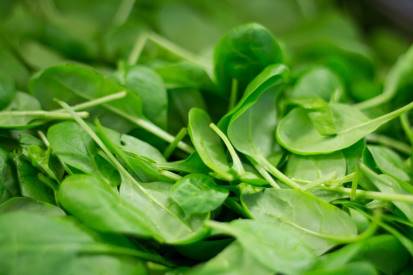Can goats eat cabbage? Yes, goats can eat cabbage. Cabbage is a good source of nutrients for goats and can provide them with many health benefits.
Cabbage is a member of the Brassica family, which also includes broccoli, Brussels sprouts, and kale. All these vegetables are high in Vitamin C and other antioxidants, making them healthy choices for humans and goats.
However, there are a few things you need to watch out for when feeding your goat cabbage. Keep reading to learn more about the benefits of cabbage for goats and what you need to know before feeding it to them.

Can goats eat cabbage?
The answer to this question is a bit complicated. Goats are browsers, meaning their diet consists mainly of leaves, twigs, and other plant matter. Cabbage falls into the leafy green vegetable category, which provides goats with many benefits.
However, you should keep a few things in mind before feeding your goat cabbage. First of all, cabbage is very high in fiber. This means that it can cause digestive problems for goats if they eat too much. It’s best to feed your goat cabbage in moderation or to combine it with other foods that are lower in fiber.
Secondly, brassica vegetables like cabbage contain compounds that can interfere with nutrient absorption. This can lead to goiters, so it’s important not to overdo it with these kinds of vegetables. A little cabbage here and there is fine, but don’t make it a staple of your goat’s diet.
[GoatAffiliate]
The benefits of eating cabbage for goats
Cabbage is an excellent source of nutrients for goats and provides a healthy alternative to other greens. Here are five benefits of feeding cabbage to your furry friends.
Packed with vitamins and minerals
Cabbage is an excellent source of vitamins C and K and folate. Vitamin C is essential for boosting immunity, while vitamin K helps with blood clotting. Folate is vital for cell growth and development. In addition, cabbage contains other minerals such as potassium, magnesium, and calcium.
Aids in digestion
Cabbage contains high levels of fiber, which helps goats maintain a healthy digestive system. Fiber also promotes regularity, prevents constipation, and helps keep the gut healthy by promoting the growth of beneficial bacteria.
Can help prevent bloat
Bloat is a condition that occurs when gas builds up in the stomach, causing it to become distended. Bloating can be painful for goats and even deadly if not treated immediately. Feeding cabbage to your goats can help prevent bloat by minimizing the amount of gas that accumulates in their stomachs.
Low in calories
Cabbage is a good option if you’re looking for a way to help your goats lose weight or maintain their current weight. This leafy green is low in calories but high in nutrients, so it will help your goats stay healthy without adding extra pounds.
Is inexpensive
Cabbages are relatively cheap, especially compared to other greens like kale or spinach. This makes them a budget-friendly food option for goat owners.
Things to watch out for when feeding cabbage to goats

As we mentioned earlier, there are a few things you need to keep in mind before feeding cabbage to your goats. Here are three things to watch out for.
Goitrogens
One of the things to watch out for when feeding cabbage to goats (or any other brassica, for that matter) is goitrogens. Goitrogens are naturally-occurring chemicals found in plants that can interfere with the production of thyroid hormones.
When consumed in large quantities, goitrogens can cause a condition known as goiter, which results in an enlarged thyroid gland. The good news is that cooking cabbage destroys goitrogens, so if you’re worried about them, you can cook the cabbage before feeding it to your goats.
Indigestion
Another thing to be aware of is that cabbage is a very rich food, which can sometimes lead to indigestion in goats. If you’re going to feed cabbage to your goats, do so in moderation and keep an eye on them for any signs of stomach upset.
If you notice diarrhea or vomiting, discontinue feeding them cabbage immediately and contact your veterinarian.
Pesticides
Finally, it’s important to make sure that any cabbage you feed to your goats is free of pesticides. Cabbage is often heavily sprayed with pesticides, so it’s essential to buy organic or wash it thoroughly before feeding it to your goats.
How often should goats eat cabbage?
Cabbage is an occasional treat for goats that should not make up more than 10% of their diet. While goats can eat cabbage daily, it is crucial to monitor their intake to prevent digestive problems.
Cabbage is rich in fiber and nutrients, which can help keep goats healthy and give them the energy they need to stay active. However, too much cabbage can cause bloating and gas, so it is essential to feed them in moderation.
When feeding cabbage to goats, it is best to chop it into small pieces or shred it to reduce the risk of choking. Cabbage is a delicious and nutritious treat for goats, but it should be fed to them in moderation to ensure their safety and well-being.
How to prepare cabbage for feeding to goats

Before you start feeding cabbage to your goats, there are a few things you need to know. If you prepare cabbage correctly, it can be beneficial to your goats. Here’s how to prepare cabbage for feeding to goats so they can enjoy all the benefits this healthy vegetable offers.
The first step is to wash the cabbage thoroughly. Be sure to remove any dirt or debris on the outside of the cabbage head. Next, cut the cabbage into small pieces so that your goats can easily eat it.
You can either feed the cabbage raw or cook it before feeding it to your goats. If you choose to cook it, boiling is the best method. Boil the cabbage for 3-5 minutes, then let it cool before feeding it to your goats.
Another option is to ferment the cabbage before feeding it to your goats. To do this, chop the cabbage into small pieces and add enough water to cover it. Then, add a little salt and let the mixture sit for 24 hours. After 24 hours, drain the water and feed the fermented cabbage to your goats.
Can baby goats eat cabbage?
Baby goats are adorable, and feeding them all sorts of goodies can be tempting. However, it’s important to remember that baby goats cannot digest food as easily as adults. For this reason, it’s best to wait until a goat is at least two months old before giving them any cabbage.
When introducing cabbage, start with small pieces and increase the amount gradually. This will give the goat’s digestive system time to adjust and help prevent stomach upsets.
Additionally, ensure that the cabbage is well-cooked and soft, as hard pieces can be difficult for goats to chew. With a bit of care and attention, you can safely introduce cabbage into your baby goat’s diet.
What other vegetables can goats eat?

While cabbage is an excellent addition to a goat’s diet, it’s far from the only vegetable that these animals can consume safely. Other members of the Brassica family and beyond also offer nutritional benefits for goats, provided they are fed in moderation and prepared appropriately. Let’s examine some other vegetables that goats can enjoy, along with potential benefits and precautions for each.
Broccoli
Broccoli is another nutritious vegetable from the Brassica family that goats can consume. It’s rich in vitamins like C, K, and A, and also provides a good amount of dietary fiber. The same goitrogen caution that applies to cabbage, however, also applies here. So while it’s perfectly okay for your goats to eat broccoli, it should not constitute a large part of their diet.
Read More: Can Goats Eat Broccoli? 5 Important Benefits
Cauliflower
Cauliflower is a versatile vegetable that’s as good for goats as it is for humans. It’s a great source of vitamins C, K, and B6, as well as fiber. However, similar to broccoli and cabbage, cauliflower contains goitrogens. While it’s perfectly fine to feed your goats cauliflower occasionally, it shouldn’t form a significant portion of their diet.
Read More: Can Goats Eat Cauliflower? 6 Awesome Benefits
Brussels Sprouts
Brussels sprouts are small, but they pack a nutritional punch that makes them a healthy treat for goats. They’re high in vitamins K and C, and also provide a decent amount of fiber. But, like the other Brassica vegetables, they contain goitrogens, so they should only be fed in moderation to prevent thyroid issues.
Read More: Can Goats Eat Brussel Sprouts? Simple Answer & Feeding Tips
Radishes
Radishes, yet another Brassica family member, can be a flavorful addition to a goat’s diet. Radishes are not as dense in nutrients as some other vegetables, but they still provide vitamin C and some fiber. The greens are also edible and nutritious. As with the other vegetables, keep in mind the potential for goitrogen content, and feed radishes as part of a diverse diet.
Read More: Can Goats Eat Radishes? 5 Great Health Benefits
Arugula
Arugula, also known as rocket, is a leafy green that’s safe and nutritious for goats to eat. It’s packed with vitamins A, K, and C, along with calcium and potassium. Unlike some other Brassica family members, arugula is not known to be high in goitrogens, so it can be a more frequent feature in a goat’s diet.
Read More: Can Goats Eat Arugula? Uncover The Surprising Answer
Can goats eat cabbage – final thoughts
So, can goats eat cabbage? The answer is yes, but you should keep a few things in mind. Feeding your goat too much cabbage can cause digestive problems due to its high fiber content.
Additionally, brassica vegetables like cabbage can interfere with nutrient absorption, so don’t overdo it with these foods. A little bit is fine, but ensure to vary your goat’s diet, so they get all the nutrients they need.
